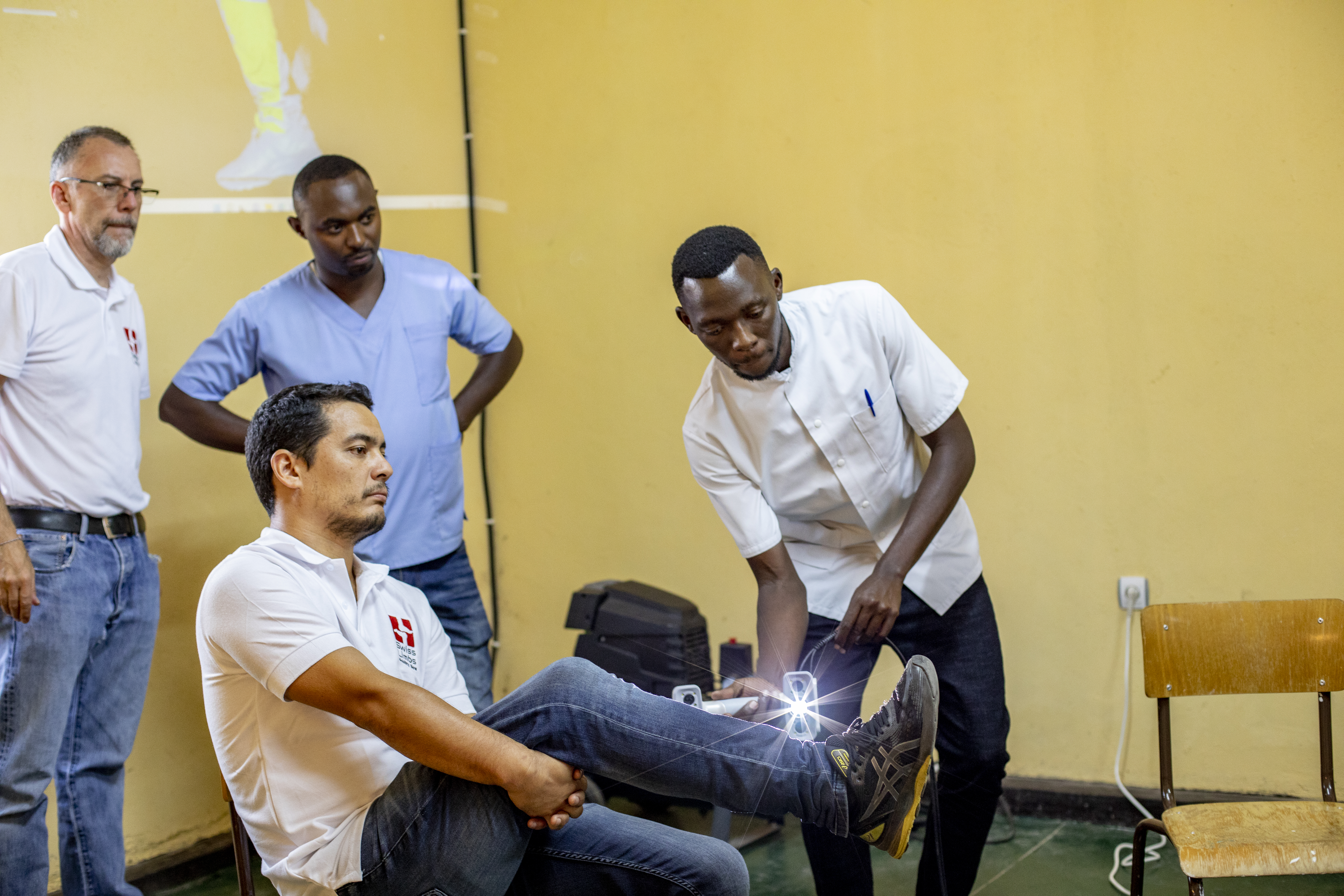UNDP Rwanda launches 3D Computer-Aided Orthotics and Prosthetics.
November 26, 2022

A Demonstration of how imaging is done with the 3D Miller Machine
Nyanza, 25 November 2022 - The United Nations Development Programme (UNDP) in Rwanda, in partnership with Swiss Limbs and Home de la Vierge des Pauvres (HVP) Gatagara, launched a 3D computer-Aided Design and Manufacturing of orthotics and prosthetics. The novel technology will help to improve the efficiency and quality of the limbs produced.
Previously, the Prosthetics and Orthotics department relied mainly on manual processes that involved seven stages in reaching the patient fitting process. This included consultation, plaster cast, negative plaster mold, melting, positive plaster mold, trimming, and adjustment. The entire process was time-consuming and not precise. As a result, the quality of the produced prosthetics/orthotics was minimal, and consequently, Persons with Disabilities became heavily affected.
The new technology will improve the efficiency of the work by scanning patients effectively during consultations and using a 3D milling machine to produce the forms.
It will also significantly reduce the processes required to produce artificial limbs compared to the formerly used techniques. The new technology will minimize the procedure from seven to three steps of orthotic designing. In addition, the quality of the newly designed prosthetics and orthotics using 3D printers offers greater comfort to the patients in terms of being lightweight and having better texture.
The launch comes after introducing smart boards as a tool to assist students with special needs in learning in a more engaging and user-friendly environment at HVP Gatagara in May 2021.
"The newly launched technology will help people with disabilities access quality prosthetics and orthotics services, which all will improve their lives and allow them to live more independently."- said Osten Chulu, Head of the Inclusive Growth Unit and UNDP Rwanda Representative at the event.
"The joy of seeing a smile on a child who can walk to school due to a new prosthetic is simply overwhelming."
Globally, access to prosthetic care is limited. The World Health Organization estimates that 30 million people need prostheses and orthotics. Yet, fewer than 20 percent of the people in need have access to them, and more than 75 percent of developing countries do not have a prosthetic and orthotic training program.
Seized by the need to provide quality prosthetics and orthotics and to reduce the processes required to produce artificial limbs, UNDP, through its Accelerator Lab, collaborated with HVP Gatagara and Swiss Limbs to establish the novel technology.
With new technology, the patients' measurements are taken using a 3D scanner and the collected data is entered into the Picasso software to design a positive cast. Lastly, the information is transferred to the 3D milling machine to produce a form.
Before the 3D milling machine launch, UNDP carried out a training series for HVP Gatagara technicians. The training consisted of hands-on training on patient casting, 3D molding program, STL data transfer to the machine and subsequent model milling, manufacture of orthopedic aid, and final fitting.
Emile Niyonkuru, a young technician and trainee, shared his experience and excitement while stating that this technology would make his job more manageable.
"Producing a positive cast of a corset to correct the posture of a 12-year girl, Jolie Mwubahamana, with scoliosis only took us one-hour using 3D milling technology. Normally, the plastering technique could have taken two days."- Emile said.
Access to quality fitting prosthetics can help young people like Jolie to regain movement, and who knows where their incredible talents can take them and the impact they can make in their communities? History has shown us that disability is not inability.
Stephen Hawking, widely considered one of the most outstanding scientists of his time, has made incredible discoveries in physics. His disability of having unsteady feet and being diagnosed with a degenerative disease did not stop him from becoming the world's most famous and acclaimed scientist.
The 2030 Agenda for Sustainable Development and the universality and equality emphasized by the "leave no one behind" commitment are values that UNDP is dedicated to upholding. Some individuals who have disabilities can regain complete movement with properly fitting prosthetics. Therefore, greater accessibility to high-quality prostheses will promote the social, physical, and economic growth of people with disabilities who need assistive prosthetics.
Under UNDP Rwanda, the Accelerator Lab assists HVP Gatagara in introducing 3D Computer Aided Design to scan patients during consultations and Computer Aided Manufacturing to produce prostheses by leveraging the power of innovation to accelerate development and deliver better results to impact lives.

 Locations
Locations


